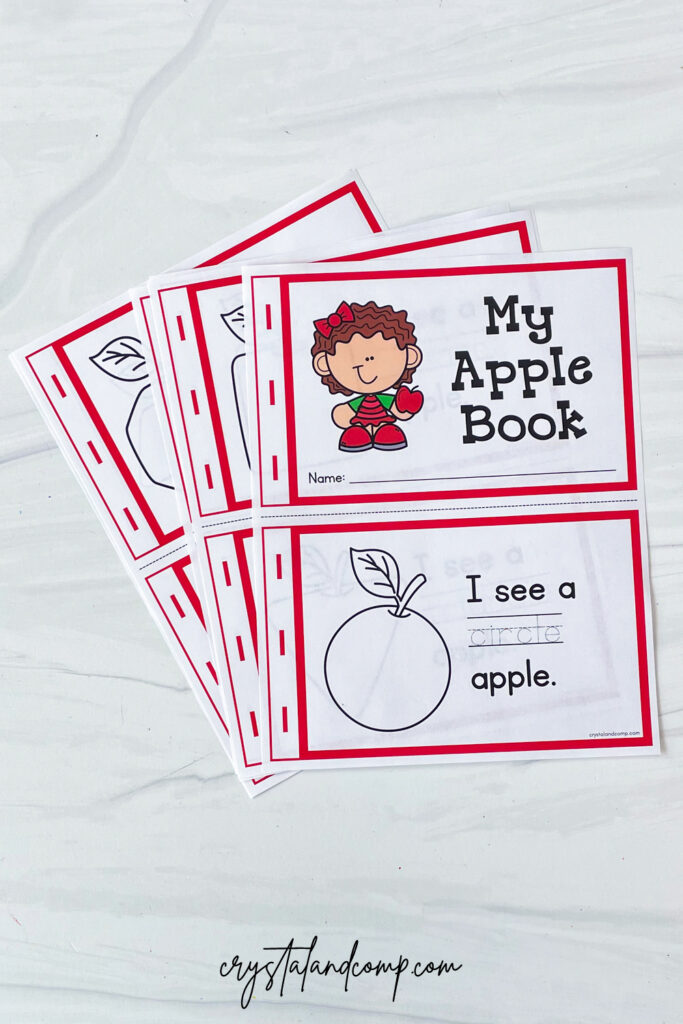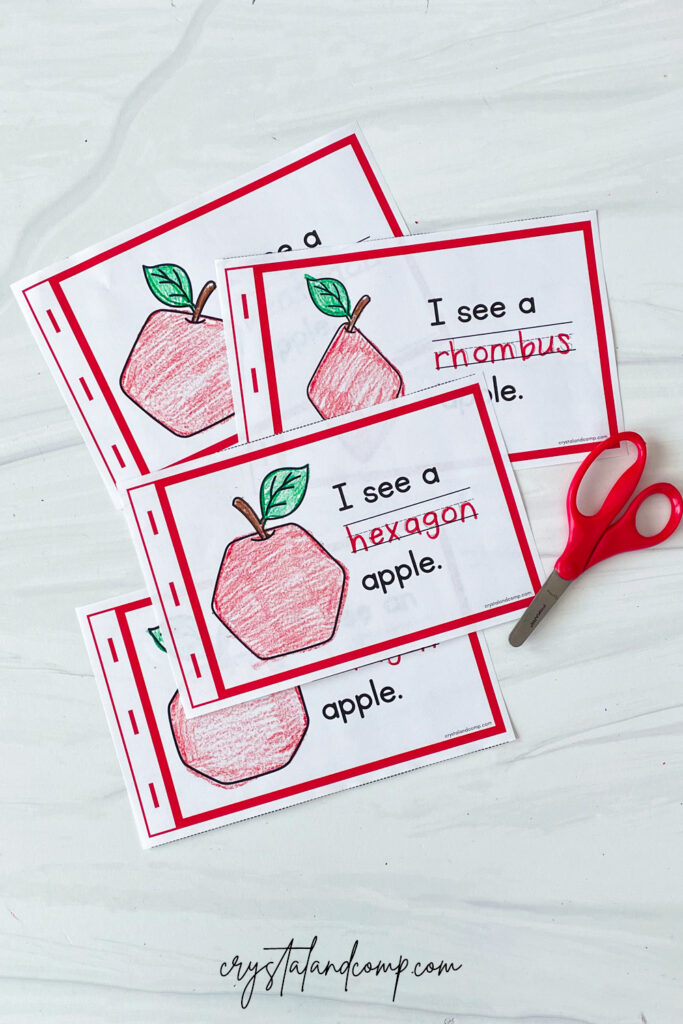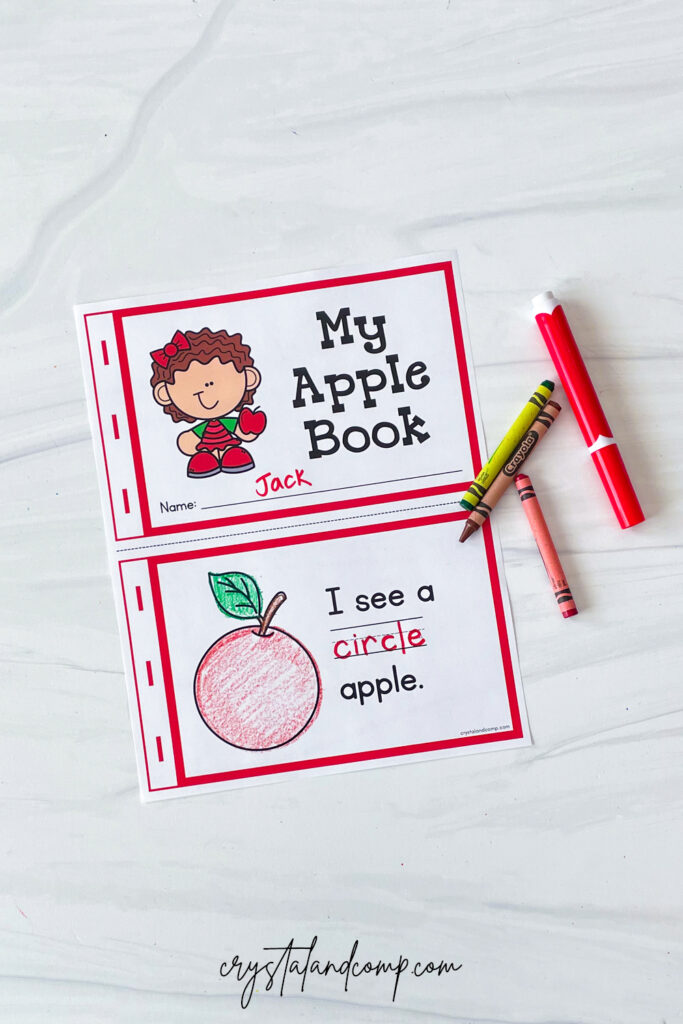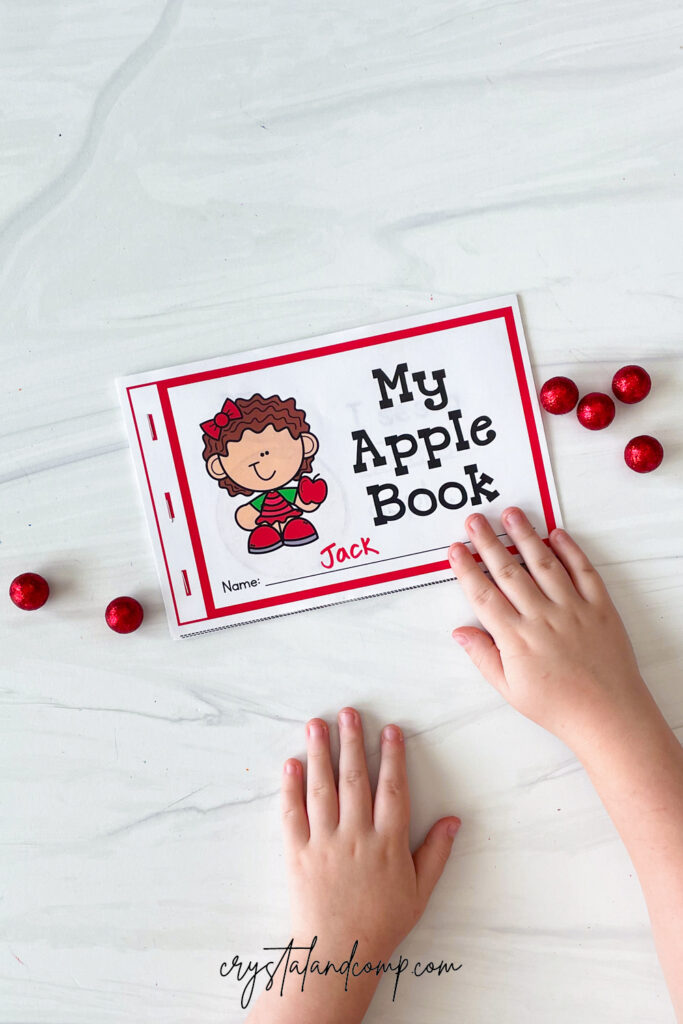Apple Printable Book
Welcome to the wonderful world of apples! This Apple Printable Book has been specifically designed to introduce preschoolers to one of the most beloved fruits around – the apple. This interactive book aims to provide young learners with a fun and educational experience around the various aspects of apples!
Preschool is an important stepping stone in a child’s development as it lays the foundation for their future learning. It is through play, exploration, and experimentation that a child’s cognitive, social, and emotional skills are developed. Free Printable Books for Preschoolers come into play as they provide accessible and educational resources to parents and caregivers who want to help their child learn and grow!

How Does Tracing Help Preschoolers?
Tracing is one of the most effective methods to encourage fine motor skills development in preschoolers. The tracing activity involves the use of pencils, crayons, or markers to follow lines or shapes on a paper. The primary objective of the process is for the child to gain control over small muscle movements within their hands and fingers. Besides fine motor skills development, tracing is excellent for enhancing hand-eye coordination, shape recognition, spatial awareness, and cognitive skills.

Preschoolers have a short attention span; hence, the tracing activity helps keep them engaged and develops their attention, focus, and hand movements. The tracing activity can also be customized to cater to the child’s level of creativity, skill level, and interests. It is an exciting way to teach children about shapes, letters, numbers, and words. Tracing activities also empower the child’s confidence, self-esteem, and reliability, making it one of the best activities to support the child’s overall development. As the child traces shapes and colors in different ways, they develop their creativity, imagination, and artistic skills. Tracing remains an essential activity in promoting the healthy growth and development of preschoolers.
Crayola Broad Line Markers 12ctCrayola Large Crayons – Assorted (8 Count), Giant Crayons for Kids & Toddlers, Ages 2+
Ticonderoga My First Tri-Write Wood-Cased Pencils, Pre-Sharpened, 2 HB, With Erasers, Neon Colors, 12 Count
ZZWS Kids Pencil Grips Toddlers Pencil Grippers 5 Stage Progressive Pencil Grips for Kids Handwriting Finger Pen Grippers Writing Posture Correction Tools for Home Preschool Classroom (5Pcs)
HP DeskJet 3755 Compact All-in-One Wireless Printer, HP Instant Ink, Works with Alexa – Seagrass Accent (J9V92A)
HP Professional Business Paper, Matte, 8.5×11 in, 48 lb, 150 sheets, works with inkjet printers (CH016A)
Scroll To The Bottom To Download!
What Are The Benefits Of Handwriting In Preschool?
Handwriting is an essential skill for preschoolers as it plays a crucial role in their development. It not only helps them learn the alphabet and build their vocabulary, but it also enhances their motor skills, cognitive abilities, and social-emotional development. Handwriting promotes the precision of fine motor skills and encourages children to develop good hand-eye coordination. This is particularly important for young children who are still learning how to control their hand movements and develop the necessary hand strength to hold a pencil or pen.

Research has shown that handwriting in preschool helps to enhance cognitive function, memory, and creativity. When children write, they naturally process information more deeply, which enables them to remember and understand better. This, in turn, can foster their creativity, as they are able to visualize and express their ideas through writing. While technology has made writing almost effortless, it is important to note that handwriting has cognitive and creative benefits that cannot be replicated through typing or texting. Encouraging children to practice handwriting skills from an early age is vital for their optimal development.
Get ready for some Autumn fun and check out these Fall Printables for Preschoolers, crafted for your little ones.
Why Should Preschoolers Learn About Shapes?
Preschoolers are at a crucial stage of development where they are highly curious and eager to learn. It is, therefore, important to introduce them to various concepts that will help them adapt to the world around them. One of the key concepts that preschoolers should learn about is shapes. Learning about shapes provides a strong foundation for logical thinking, problem-solving, and mathematics.
Shapes are all around us, and it is important for preschoolers to be able to recognize and identify them. A basic understanding of shapes helps children categorize objects, which aids in visual discrimination and perception. The ability to identify and match shapes can help children make connections between different objects and their settings, leading to better spatial awareness skills. As children learn about basic shapes such as circles, squares, and triangles, they will be able to combine them to make complex shapes such as polygons, cones, and cylinders.

Teaching preschoolers about shapes is crucial for their early mathematical development. An understanding of shapes lays the foundation for mathematical concepts such as symmetry, angles, and measurements. Teaching children about the properties of shapes such as the number of sides, angles, or lines of symmetry can help them understand complex concepts such as fractions and shapes’ geometric properties. Besides, shapes provide an opportunity to introduce preschoolers to topics such as patterns and sequences that are critical to early mathematics. A strong understanding of shapes helps develop the mathematical fluency and literacy skills that are important for a child’s academic success.
Tracing Printables For Preschoolers
Tracing printables are an exceptional means to promote fine motor skills development in preschoolers. Fine motor skills are crucial for early childhood education as they aid in developing better writing skills. Tracing printables can take various forms from alphabets to numbers, shapes, and colors, all of which are vital in enhancing the child’s cognitive.
- Leaf Line Tracing Printables
- Watermelon Line Tracing Printables
- Pirate Line Tracing Printables
- Back to School Line Tracing Printables

Why Is Motor Development Important In Preschool?
Motor development in preschoolers is an essential aspect of their growth and development. As a child grows, there are several milestones that they should achieve in terms of development of their gross and fine motor skills. Gross motor skills help preschoolers to coordinate large muscle groups in their arms, legs, and core, while fine motor skills support their ability to use their smaller muscles in their hands and fingers for tasks such as writing and grasping objects. With mastery of these skills, preschoolers are able to become more independent and explore the world around them with more confidence.

Research shows the benefits of motor development in preschoolers go beyond physical capabilities. Well-developed motor skills help children to maintain appropriate weight and reduce the risk of obesity. This is because children who are more active burn more calories leading to a balanced diet. Children who have mastered their motor skills have an easier time in school since they are able to manage their movements and accomplish tasks quickly. Children who struggle with motor coordination often struggle with handwriting, tying shoes, and other fine motor activities that could lead to frustration and low self-esteem. It is important for caregivers and educators to encourage preschoolers to participate in physical activities that promote motor development in various settings including school, home and during playground activities.
Why Is It Important For Preschoolers To Write Their Name?
It is essential for preschoolers to learn how to write their names as it is the foundation of their future academic and social success. By learning to write their names, preschoolers develop not only their fine motor skills but also their cognitive and linguistic abilities. Writing their names is the perfect way for them to learn about letters, phonics, and simple spelling rules.
Writing their names also helps to build their confidence and self-esteem. Preschoolers who know how to write their names feel more independent and capable of achieving more complex goals. With the ability to write their names, preschoolers can become more active learners, eager to explore new ideas and concepts.

Writing their names is an important life skill that can help preschoolers in a variety of settings. For example, in a classroom, a teacher can quickly identify each child by their name tag. This makes it easier for him or her to understand the needs and interests of each child and to personalize their learning experience. Similarly, in social settings, preschoolers can introduce themselves confidently and proudly by writing their names. This helps to form new friendships, foster social connections, and develop a sense of belonging.
Free Preschool Printable Books
Free preschool printable books are an incredible resource for parents and educators alike. These books are designed to help young children develop important skills such as letter recognition, vocabulary, comprehension, and critical thinking. Not only do they provide an excellent source of educational content, but they can also be used as a way to engage children and encourage a love of reading.
- Printable Pirate Counting Book
- My Letter R Book Printables
- Summer Printable Book
- First Day Of School Printable Book
- Butterfly Life Cycle Printable Book

Using printable books is an effective way to teach preschoolers about apple cultivation and its significance. These books provide a platform for early literacy and can help children familiarize themselves with letters, sounds, and reading. Through engaging activities like tracing, handwriting practice, and coloring, these books promote motor skills development, cognitive growth, and vocabulary building.







Hi! I can’t wait to use this in September!